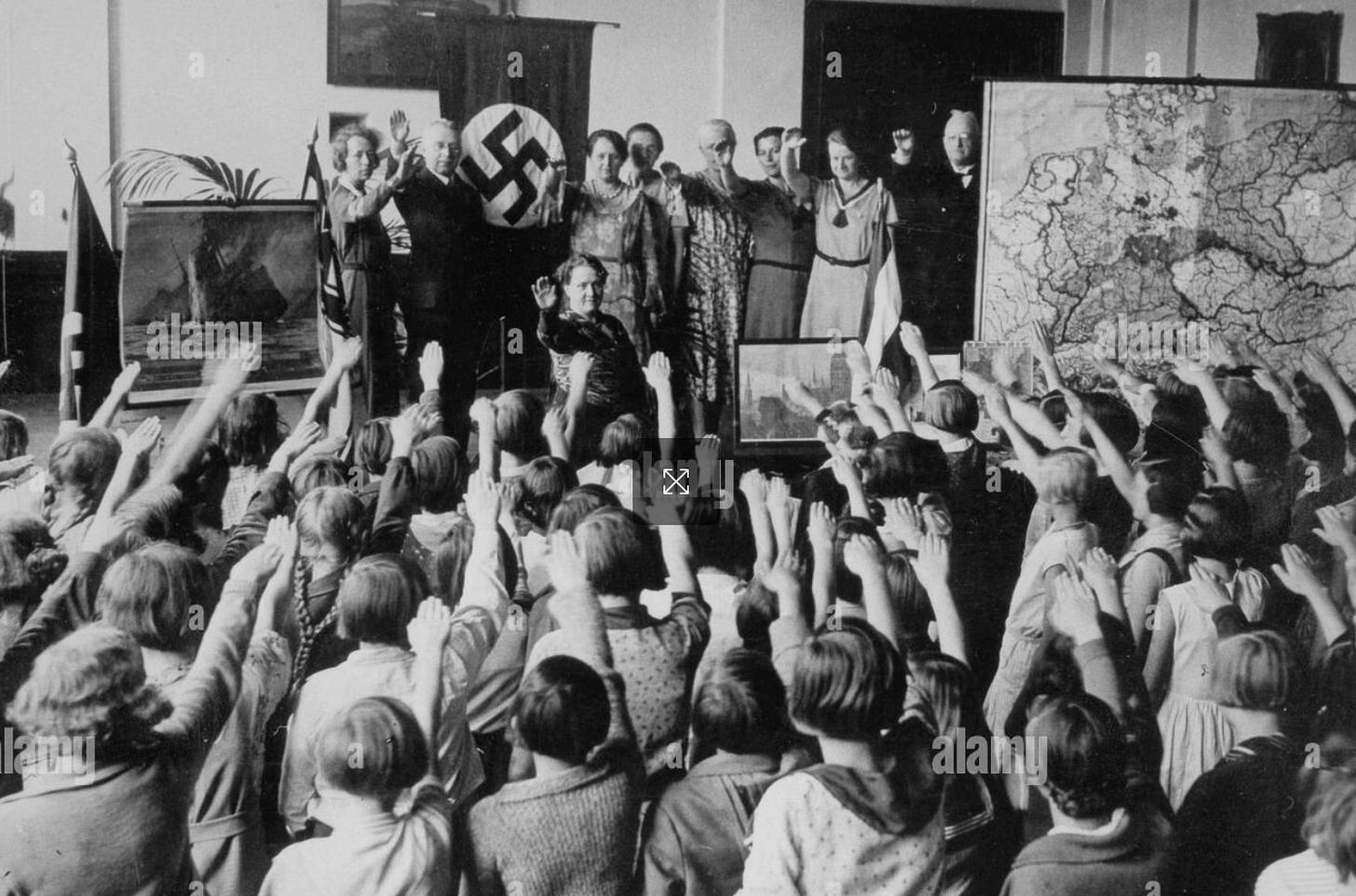Farage’s Historical Revisionism: Myth-Making in Modern Politics
Nigel Farage’s New Year message, delivered from historic Blenheim Palace, represents more than just a political rallying cry. It exemplifies a growing trend among populist and authoritarian figures to manipulate history for self-serving agendas. Farage’s invocation of a simplified and sanitized past highlights how history can be reframed as a tool for myth-making rather than a source of shared understanding. This article explores the dangerous implications of Farage’s approach and its parallels with other global leaders who rewrite history to consolidate power and ideology.
Reframing History: The Blenheim Backdrop
Farage’s decision to speak from Blenheim Palace, the birthplace of Winston Churchill, is deeply symbolic. Churchill conjures an image of a particular type of Britishness: stoic, determined, defiant, and unbreakable. At Blenheim Palace, Farage talks about Churchill and the time when he was in charge; a time when people were looked after. What Farage is actually referring to here is the dawn of the NHS and the welfare system in the UK—institutions that transformed the country and provided a safety net for millions. Yet these are the very institutions Farage would happily see sold off to the US. One wonders what Churchill would have made of this contradiction.
How Farage Rewrites World War II Through an Anglo-American Lens
This image of Churchill is itself a myth, carefully crafted by Churchill to solidify his legacy. Farage’s use of Churchill as a symbol of unblemished greatness conveniently ignores inconvenient truths. Churchill did not single-handedly defeat Hitler and the Nazis in World War II. Britain’s survival relied on resources drawn from across the British Empire, often at a terrible cost.
Severe famines in India, caused in part by Britain extracting food to support the war effort, are a stark example of this price (Mukerjee, 2010). Polish pilots, too, played a crucial role in the Battle of Britain, and the Soviet Union’s opening of the Eastern Front forced Hitler into a disastrous two-front war (Roberts, 2009). These realities complicate the simplistic narrative of British triumph, but they do not detract from the courage and resilience of the British people during WWII. Instead, they highlight the importance of taking an honest approach as we remember our shared histories.

Farage’s narrative of Britain and America ‘extinguishing Nazism and Imperial Japan’ (Farage, 2024) erases these contributions and focuses solely on Anglo-American efforts. This version of history glorifies a narrow perspective while neglecting the collaborative and often tragic realities of wartime alliances. Farage doesn’t want people to critically examine our history because that would make it harder for him to sell us these myths. Farage’s historical revisionism mirrors tactics employed by other authoritarian leaders, such as Vladimir Putin. In Russia, Putin has reinterpreted Soviet history to glorify its achievements while downplaying atrocities. For example, World War II is referred to in Russia as ‘The Great Patriotic War.’ When it is remembered and celebrated in Russia, it conveniently removes the memory of Soviet compliance with the Nazi invasion of Poland, thus sanitizing and simplifying history (Figes, 2007). These efforts serve to create uncritical loyalty and a sense of nationalistic pride at the expense of a fuller understanding of history.
Myth-Making and Brexit
Central to Farage’s speech is his portrayal of Brexit as a reclaiming of British sovereignty. Yet, his rhetoric around ‘taking back control’ is fraught with contradictions and oversimplifications. Trade disruptions, labour shortages, and diminished global influence highlight the costs of leaving the EU (Springford, 2021). Farage’s preferred no-deal Brexit would have exacerbated these issues, demonstrating that his vision was rooted more in ideology than in pragmatic governance.
Farage’s call for sovereignty is undermined by his insistence on the UK’s reliance on America and Donald Trump. This dependency conflicts with his claims of independence, revealing a selective application of the sovereignty principle. The contradiction becomes even starker when considering the UK’s increased vulnerability post-Brexit. Farage presents Brexit as a triumph of self-determination, yet by emphasizing the need for American support—particularly under a leader like Trump—he implicitly suggests ceding power to the United States. This is the antithesis of ‘taking back control.’ One is left to wonder if there was a grander plan all along: to weaken the EU by pulling the UK out, leaving it more susceptible to the demands of external powers such as the US. Farage’s Brexit narrative exemplifies how populists construct myths to rally support, ignoring inconvenient truths and long-term consequences.
Immigration and Fear-Mongering
Farage’s speech heavily focuses on immigration, painting it as a threat to British identity and security. This rhetoric follows a familiar populist playbook. By emphasizing migrants arriving via dinghies, Farage distorts the broader context of immigration, which includes vital contributions to sectors like healthcare and education (Portes, 2018). His framing reduces complex migration patterns to a simplistic and fear-inducing narrative.
Britain does need to have an honest conversation on immigration, particularly post-Brexit. It is critical that these discussions are based on the truth—and this goes for both sides of the debate. The contributions of migrants to the UK’s economy and public services are often overlooked. For example, a significant portion of NHS staff are from overseas, and sectors like agriculture and social care rely heavily on migrant labour (Rienzo, 2020). Addressing these facts does not negate legitimate concerns about border control but ensures the discussion remains grounded in reality rather than hysteria. Farage’s language portrays migrants as invaders rather than individuals fleeing conflict and seeking asylum. This approach fosters division and ignores the UK’s obligations under international law. Leaders like Hungary’s Viktor Orbán have similarly weaponized immigration to consolidate power, framing migrants as existential threats to national identity.
Weaponizing Education
Farage’s call to teach children a version of history they can ‘be proud of’ is perhaps the most troubling aspect of his speech. This approach echoes global trends of using education as a tool for ideological indoctrination. Informed citizenship is key, as without it, we are vulnerable to the likes of leaders such as Farage, who are keen to manipulate our ignorance. During the Third Reich, German children were indoctrinated into a version of Germanic history that glorified the state and suppressed problematic or uncomfortable realities (Koonz, 2003). Whenever anyone talks of a history we should be ‘proud’ of, we should be very wary: what we need is to be taught a history that honours the truth.
A true education system equips students to grapple with history’s complexities, fostering informed citizenship and critical thinking. Farage’s vision risks erasing uncomfortable truths, from colonial exploitation to systemic racism, in favour of a narrative that promotes uncritical nationalism. Examples from history illustrate the dangers of such policies. Putin’s Russia, for instance, has reshaped school curricula to glorify Soviet achievements while downplaying Stalinist purges (Figes, 2007). These efforts create a population more susceptible to state propaganda and less capable of challenging authoritarian narratives.
The Global Trend of Historical Revisionism
Farage’s reframing of history aligns with a broader global phenomenon in which populist and authoritarian leaders reshape historical narratives to suit their agendas. From Bolsonaro in Brazil to Xi Jinping in China, history is increasingly wielded as a political weapon. This trend has dangerous implications. By distorting history, leaders erode the foundation of shared cultural and historical knowledge, fostering division and mistrust. Revisionist histories often serve to legitimize leaders’ authority, aligning their policies with glorified versions of the past. Rewriting history narrows the scope of acceptable discourse, silencing critics who challenge the official narrative.
Conclusion: History as a Battleground
Farage’s New Year message is a stark reminder of the power of history—and the dangers of its misuse. By reframing Britain’s past to suit his political agenda, Farage engages in the same self-serving myth-making seen in authoritarian regimes around the world. This approach is not about informing or empowering the public but about consolidating influence through carefully curated narratives.
Britain’s future depends on confronting this trend with honesty and critical inquiry. History must be a tool for understanding, not a weapon for division. Farage’s vision—and those like it—offers only a distorted mirror of the past, one that serves the few at the expense of the many. Ultimately, what Farage wants is a compliant and uncritical citizenry, caught up in the thrall of the myths he propagates. He does not want informed people, because then, his myths will crumble. The UK must reject this revisionism and embrace a more inclusive and truthful engagement with its shared history. Citizens must advocate for education that prioritizes critical thinking and push back against attempts to sanitize history for political convenience.
References
Farage, N. (2024). New Year Message. YouTube (Accessed 3.1.2025)
Figes, O. (2007). The Whisperers: Private Life in Stalin's Russia. Penguin Books.
Koonz, C. (2003). The Nazi Conscience. Belknap Press of Harvard University Press.
Mukerjee, M. (2010). Churchill's Secret War: The British Empire and the Ravaging of India during World War II. Basicp;[ Books.
Portes, J. (2018). Immigration: How Economic Facts Shape Policy. Oxford University Press.
Rienzo, C. (2020). Migrants in the UK Labour Market: An Overview. The Migration Observatory, University of Oxford.
Roberts, G. (2009). Stalin's Wars: From World War to Cold War, 1939-1953. Yale University Press.
Springford, J. (2021). The Cost of Brexit to the UK Economy. Centre for European Reform.



